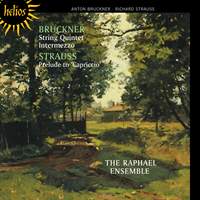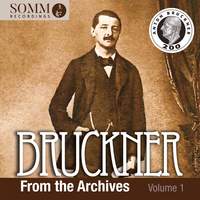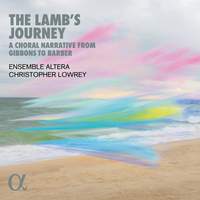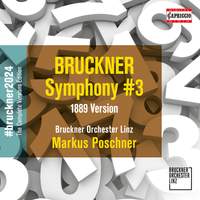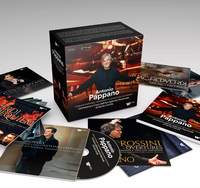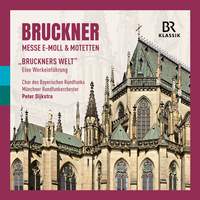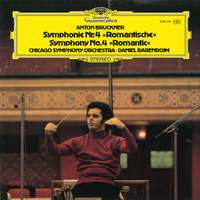
Anton Bruckner (Composer)
Born: 4th September 1824, Ansfelden, Austria
Died: 11th October 1896, Vienna, Austria
Nationality: Austrian
Josef Anton Bruckner was an Austrian composer, organist, and music theorist best known for his symphonies, masses, Te Deum and motets. The first are considered emblematic of the final stage of Austro-German Romanticism because of their rich harmonic language, strongly polyphonic character, and considerable length. Bruckner's compositions helped to define contemporary musical radicalism, owing to their dissonances, unprepared modulations, and roving harmonies.
Unlike other musical radicals such as Richard Wagner and Hugo Wolf, Bruckner showed extreme humility before other musicians, Wagner in particular. This apparent dichotomy between Bruckner the man and Bruckner the composer hampers efforts to describe his life in a way that gives a straightforward context for his music.
Read more at https://en.wikipedia.org/wiki/Anton_Bruckner
Browse: Bruckner
Further Reading: Bruckner
Recording of the Week,
Andris Nelsons completes his Bruckner cycle with the Gewandhausorchester
The Latvian conductor and his Leipzig ensemble complete their cycle of Bruckner symphonies with radiant, dramatic performances of Symphonies 1 and 5.
Recording of the Week,
Andris Nelsons conducts Bruckner's Second and Eighth Symphonies
The Gewandhausorchester and Andris Nelsons continue their Bruckner cycle with sublime, lyrical performances of the Second and Eighth Symphonies.
All Genres: Bruckner
Popular Works: Bruckner
- Aequale No. 1 in C minor, WAB 114 (12)
- Aequale No. 2 in C minor, WAB 149 (12)
- Afferentur regi, WAB 1 (19)
- Ave Maria (32)
- Ave Maria (1856), WAB 5 (14)
- Ave Maria (1861), WAB 6 (102)
- Christus factus est (19)
- Christus factus est, WAB 11 (56)
- Ecce sacerdos magnus (24)
- Erinnerung (9)
- Fantasie in G major (8)
- Intermezzo for String Quintet in D minor (12)
- Inveni David, WAB19 (14)
- Locus iste, WAB 23 (100)
- Mass No. 1 in D Minor (10)
- Mass No. 2 in E minor (30)
- Mass No. 3 in F Minor, WAB 28 (28)
- Os justi meditabitur sapientiam (65)
- Overture in G Minor, WAB 98 (12)
- Pange lingua (24)
- Psalm 150, WAB 38 (13)
- String Quartet in C minor, WAB111 (10)
- String Quintet in F major (27)
- Symphonies 0-9 (16)
- Symphonies 1-9 (45)
- Symphony No. 00 in F minor 'Study Symphony' (22)
- Symphony No. 0 in D minor 'Nullte' (46)
- Symphony No. 1 in C minor (101)
- Symphony No. 2 in C minor (101)
- Symphony No. 3 in D minor ‘Wagner Symphony' (152)
- Symphony No. 4 in Eb Major 'Romantic' (269)
- Symphony No. 5 in B flat major (190)
- Symphony No. 6 in A major (146)
- Symphony No. 7 in E Major (278)
- Symphony No. 8 in C minor (235)
- Symphony No. 9 in D Minor (240)
- Te Deum in C major, WAB 45 (62)
- Tota pulchra es, antiphon, WAB 46 (35)
- Vexilla regis prodeunt, WAB 51 (27)
- Virga Jesse, WAB 52 (62)
Recent Best Sellers: Bruckner
New Releases: Bruckner
-
45 CDs: Original price ($146.25) Reduced price $131.75
-
4 CDs: $33.25
-
CD: Original price ($16.50) Reduced price $14.75Download from $9.25
-
17 CDs: $60.75
-
CD: $18.25Download from $10.00
-
View all new releases
Future Releases: Bruckner
-
27 CDs: Original price ($87.75) Reduced price $79.50
-
CD: $18.75Download from $10.00
-
CD: $18.25Download from $10.00
-
2 CDs: $20.50Download from Original price ($10.00) Reduced price $7.00
-
2 Vinyl Records: Original price ($74.25) Reduced price $67.25
-
View all future releases







